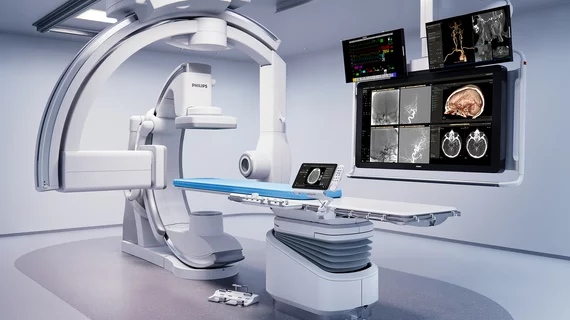Philips announces new Azurion update focused on improving care for stroke patients
Philips Healthcare has announced a new update to its Azurion image-guided therapy platform designed to make the technology, first launched seven years ago, more efficient. The update is centered around a new Azurion neuro biplane system that helps operators switch back and forth between acquiring 2D and 3D images in just a matter of seconds.
Because the Azurion platform is often used to diagnose, treat and manage stroke patients, every moment that can be saved can make a big impact on the patient’s long-term outlook by reducing the time to revascularization.
The update also includes enhanced X-ray detector flexibility, a new-look head immobilizer and automatic beam rotation that ensures all images are correctly oriented. In addition, Philips has said the new system uses 10% less energy than prior versions, helping departments boost patient outcomes while decreasing their environmental impact.
“Working closely with leading interventionists, we designed the latest Azurion neuro biplane to meet their requirements of superior patient care, optimized angio suite performance, and efficient return on investment,” Mark Stoffels, business leader of image-guided therapy systems at Philips, said in a statement announcing the update. “Together, I am confident we can continue to reduce the impact of stroke, helping more patients to recover faster and reducing long-term impact on their health.”
“As a clinician, it’s an extension of our eyes, hands, and mind. It's not just an X-ray system; it's the entire suite,” Atul Gupta, MD, chief medical officer of diagnosis and treatment for Philips and a practicing radiologist, said in a separate media release. “And it was designed to connect all of the devices and the data, so we can control it at the table side. Just like my car, it gets me and all the other people who work in an interventional suite to our destination: treating a patient faster and safer than before."

